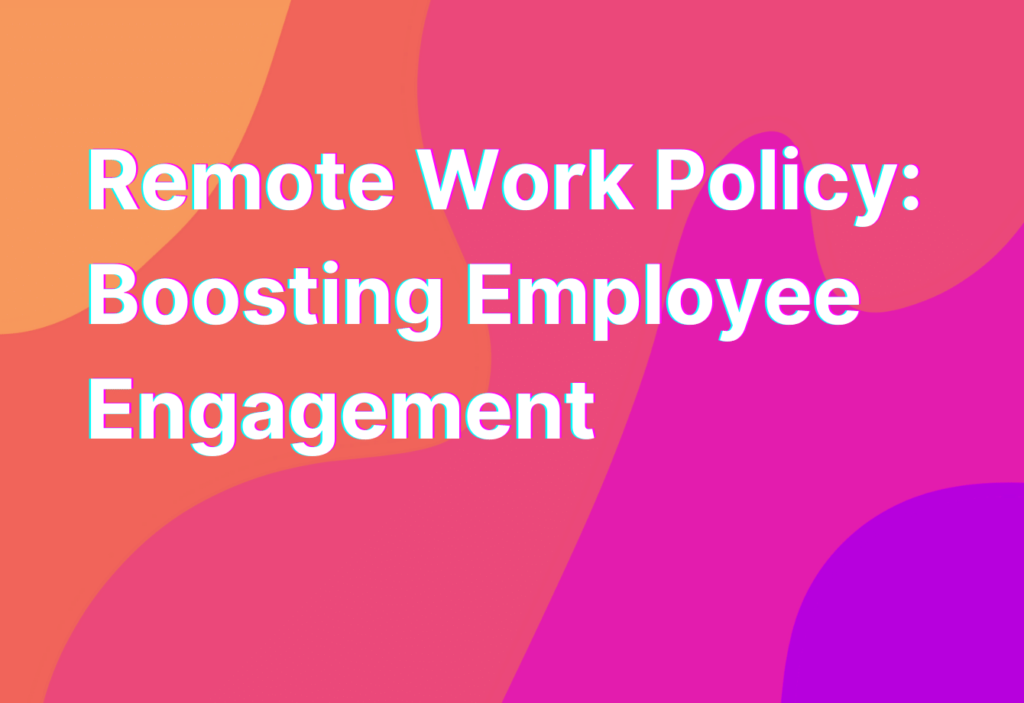Remote Work Policy: Boosting Employee Engagement
Remote work has become increasingly popular in recent years, and for good reason. It offers flexibility, work-life balance, and the ability to work from anywhere in the world. However, managing remote teams comes with its own set of challenges. One way to overcome these challenges and boost employee engagement is by implementing a remote work policy. In this article, we will explore the benefits of a remote work policy and provide tips on how to create an effective one.
The Benefits of a Remote Work Policy
A remote work policy is a set of guidelines and expectations that outline how remote work will be conducted within an organization. It provides clarity and structure for both employees and managers, ensuring that everyone is on the same page. Here are some of the benefits of implementing a remote work policy:
- Increased productivity: When employees have clear expectations and guidelines, they are more likely to stay focused and productive. A remote work policy can help set boundaries and establish routines that promote productivity.
- Improved work-life balance: Remote work allows employees to have more control over their schedules, leading to a better work-life balance. A remote work policy can help ensure that employees have the flexibility they need to take care of personal responsibilities while still meeting work obligations.
- Higher employee satisfaction: Offering remote work as an option can increase employee satisfaction and morale. A remote work policy shows that the organization values work-life balance and trusts its employees to get the job done, which can lead to higher levels of engagement and loyalty.
- Expanded talent pool: By allowing remote work, organizations can tap into a larger talent pool. Remote work eliminates geographical barriers, allowing companies to hire the best candidates regardless of their location.
- Cost savings: Remote work can lead to cost savings for both employees and employers. Employees save on commuting expenses, while employers can reduce office space and overhead costs.
Creating an Effective Remote Work Policy
Now that we understand the benefits of a remote work policy, let’s explore how to create an effective one. Here are some key considerations:
- Define eligibility: Clearly define which roles or positions are eligible for remote work. Not all jobs may be suitable for remote work, so it’s important to establish criteria for eligibility.
- Set expectations: Clearly communicate the expectations and responsibilities of remote employees. This includes work hours, availability, communication protocols, and deliverables.
- Establish communication channels: Determine the communication tools and channels that will be used for remote collaboration. This could include video conferencing, project management software, and instant messaging platforms.
- Provide resources: Ensure that remote employees have the necessary resources and equipment to perform their jobs effectively. This may include providing laptops, software licenses, and access to company systems.
- Encourage self-care: Remote work can blur the lines between work and personal life, leading to burnout. Encourage employees to prioritize self-care and provide resources to support their well-being. For more tips on boosting employee engagement through self-care, check out this article.
Remember, a remote work policy should be flexible and adaptable. It’s important to regularly review and update the policy based on feedback and changing circumstances. By creating an effective remote work policy, you can boost employee engagement and create a positive remote work culture within your organization.
Wrapping Up
Implementing a remote work policy is essential for managing remote teams and boosting employee engagement. It provides clarity, structure, and flexibility for both employees and managers. By defining eligibility, setting expectations, establishing communication channels, providing resources, and encouraging self-care, organizations can create an effective remote work policy that promotes productivity, work-life balance, and employee satisfaction. So, what are you waiting for? Start creating your remote work policy today and reap the benefits of a remote workforce!


